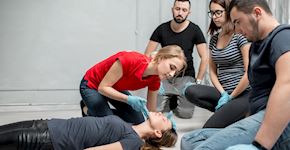Emergency First Aid in the Workplace
Online Courses Learning
Summary
- Certificate of completion - Free
- Exam(s) / assessment(s) is included in price
- Tutor is available to students
Add to basket or enquire
Overview
Emergency First Aid Certification
First aid skills save lives. The first few minutes following an accident or other emergency are crucial and timely intervention can make all the difference. Whatever your industry or professional background, knowing how to administer basic first aid will stand you in good stead to assist someone in need.
Certificates
Certificate of completion
Digital certificate - Included
CPD
Course media
Description
In this course, you will learn basic first aid techniques that you can use to treat casualties who are suffering from a variety of injuries and ailments, including burns, blood loss and shock. You will learn how to assess an emergency situation, how to keep yourself safe and how to keep casualties as comfortable and safe as possible whilst waiting for professional help to arrive.
You Will Learn:
How to undertake a primary assessment of a casualty’s condition, how to employ the ABC protocol to gain an overview of the situation and how to place someone in the recovery position.
The purpose of CPR, when it is performed, how it is carried out and how the process must be modified to meet the needs of children, infants and pregnant women.
How to minimise blood loss if someone is bleeding, how to assess and bandage a wound, what to do if there is a foreign object embedded in a wound and how to identify and treat shock.
The difference between mild and severe cases of choking, how to identify instances of each and how to dislodge obstructions in both adults and children using appropriate combinations of back blows and abdominal thrusts.
How to cool and bandage a burn, how to minimise further skin damage, how to decide whether a burn warrants professional medical attention and what to bear in mind when assisting a casualty with chemical or electrical burns.
How to manage an incident, keep yourself and others safe when administering first aid and pass on relevant information to emergency services personnel.
How to identify the signs of a spinal injury, how to decide whether a head injury warrants professional medical attention and how to treat eye injury and irritation.
How to tell when someone has broken a bone, the symptoms and signs of a muscle sprain and how to help someone who has received an electric shock.
The most common symptoms of an epileptic attack, how to respond when someone has a seizure and the information you must record when someone has a fit.
How to remember and identify the signs of a heart attack or stroke and when to summon help.
Benefits of Taking This Course:
You will feel confident in helping an ill or injured casualty.
You will be able to judge whether professional medical assistance is required.
You will be able to guide others in an emergency situation and pass on your knowledge to others in the workplace.
If you work with elderly people or children, you will benefit from understanding how and why these groups require slightly different first aid interventions.
If you are interested in a career in the healthcare field, you will benefit from this introduction to some of the most common sources of injury in day-to-day life.
Questions and answers
Currently there are no Q&As for this course. Be the first to ask a question.
Reviews
Currently there are no reviews for this course. Be the first to leave a review.
Legal information
This course is advertised on reed.co.uk by the Course Provider, whose terms and conditions apply. Purchases are made directly from the Course Provider, and as such, content and materials are supplied by the Course Provider directly. Reed is acting as agent and not reseller in relation to this course. Reed's only responsibility is to facilitate your payment for the course. It is your responsibility to review and agree to the Course Provider's terms and conditions and satisfy yourself as to the suitability of the course you intend to purchase. Reed will not have any responsibility for the content of the course and/or associated materials.


